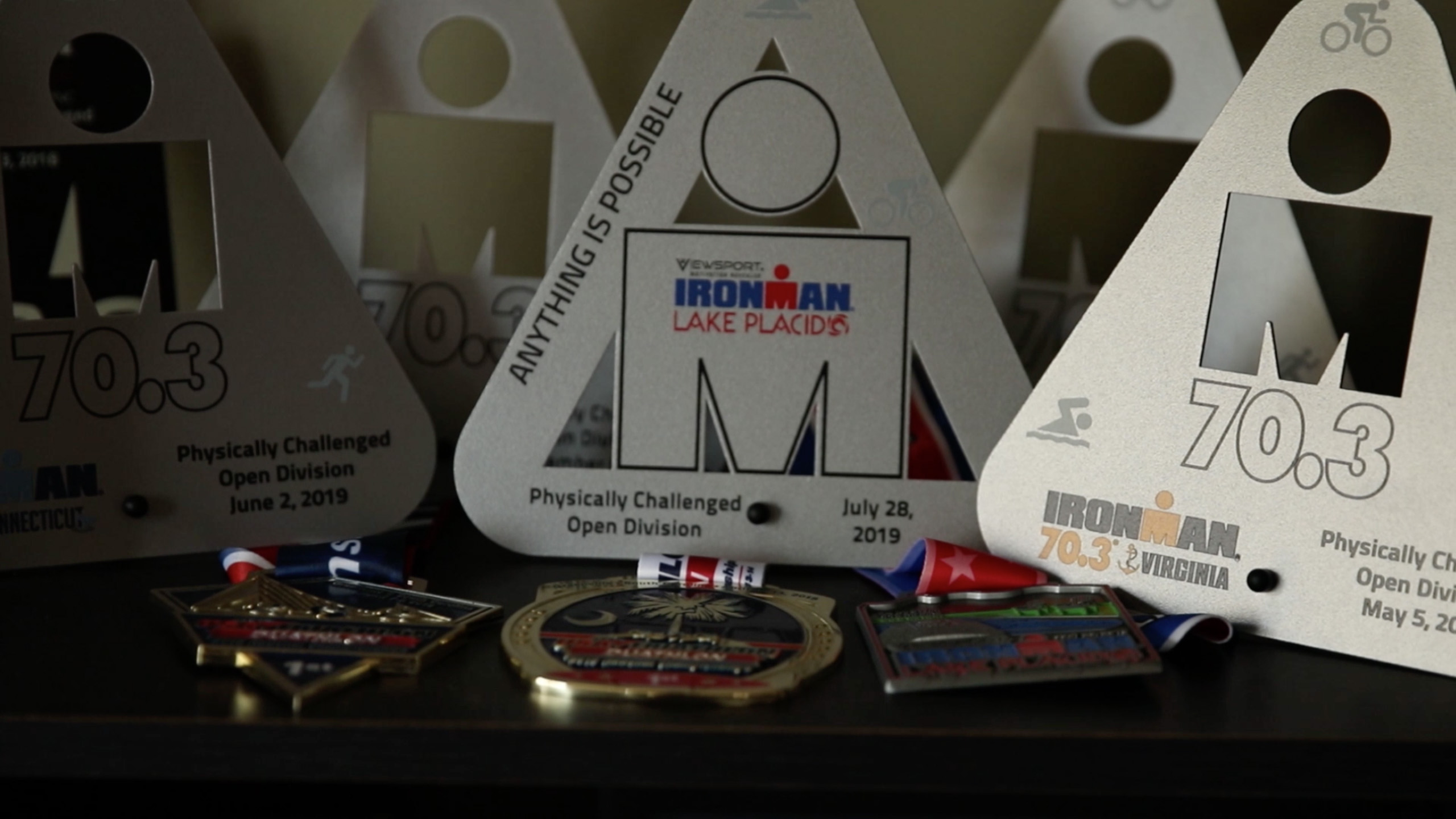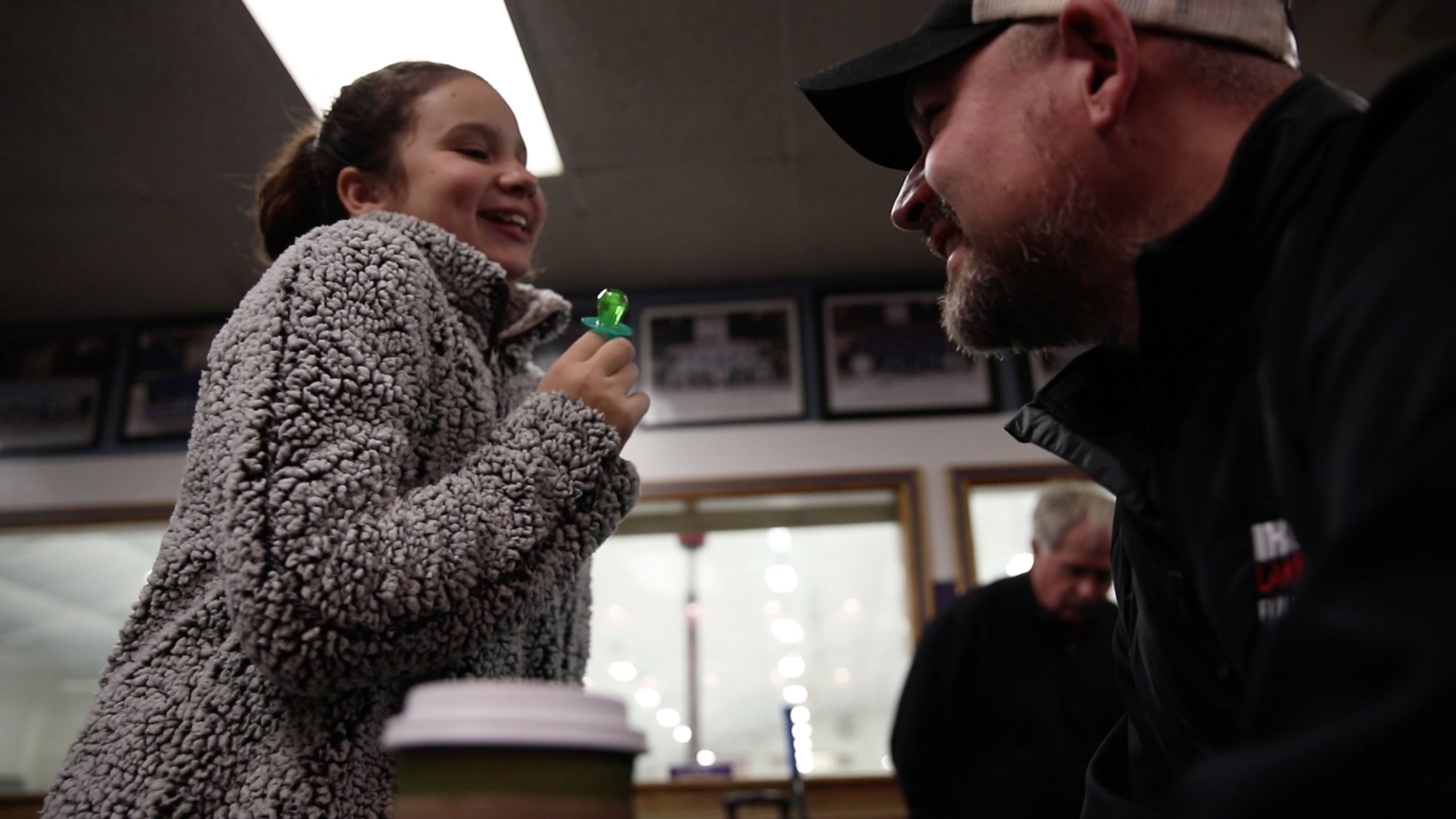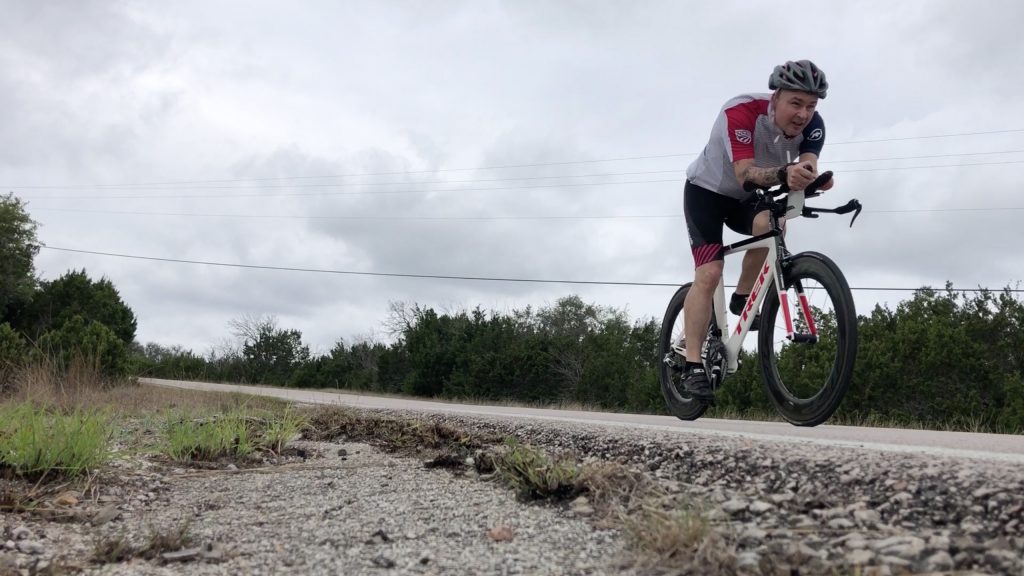One part dedication. One part obsession. All parts satisfaction.
Obsession, dedication and satisfaction as a triathlon competitor
A decade ago, Ulf Oesterle considered a triathlon more of a pipe dream than a reality.
He was a mountain biker, not a road cyclist. He swam recreationally, but never in a wetsuit or even in a lap pool. As far as running, he never entered anything more than a 5K race.
None of that deterred Oesterle from signing up for his first-ever Ironman 70.3 Syracuse in 2010. And it turned out about as well as could be expected for someone with no formal training. He finished in the bottom five percent.
“It was very much a scenario that was like, don’t drown on the swim, have a good bike ride and walk, run, struggle through the last leg to get to the finish line,” Oesterle said. “I did it. I finished (and) got my medal.”
Oesterle remembers afterward vowing to never do another triathlon again, but that didn’t last for too long. He’s now among Ironman’s top-ranked physically challenged triathletes in the world.
Born without his left hand, Oesterle has managed to figure out a way or a workaround to accomplishing life’s ordinary tasks. When it came to sports, in high school he played varsity basketball and soccer. He also snowboarded, skateboarded, played roller hockey with friends and ice hockey on ponds.
Still active in his early thirties and one Ironman down, Oesterle found himself motivated to sign up for another local triathlon for a different reason — he would get to race alongside icons he watched on TV: former professional BMX rider Dave Mirra and Eric Hinman, who Oesterle considers a “legend” among triathletes.
“You see those folks around and it’s like, OK, I want to race with them,” Oesterle said. “That’s kind of how it got started.”
From there, Oesterle got better race by race. As a paratriathlete with nearly 40 races under his belt, he has been the first out of the water, set personal records, been atop the pyramid at medal ceremonies.

Before the COVID-19 pandemic uprooted his schedule, his eye was set on North American and world championship races, hoping they would lead him to a spot on the U.S. Paralympic team.
“I mean it’s a dedication to some degree,” he said. “It’s an obsession to some degree. I get satisfaction out of racing that I don’t with other things.”
Talking to Oesterle before the pandemic, he was able to rattle off, almost from memory, his schedule for the rest of the year. He had a race almost every weekend, often lined up with speaking events or conferences, and then traveling back to Syracuse during the week.
Between training and racing, teaching as an assistant professor for the Newhouse School’s Bandier Program, and being a father of two, he maintains a fairly rigid schedule, which doesn’t include much time to socialize.
“That’s one of the tradeoffs, but I’m willing to give that up to do some racing,” Oesterle said.
Instead, Oesterle looks for friends on the triathlon circuit. He may only see them once or twice a year at races but they remain in contact typically through social media as ways to provide motivation and support.
“On the days where you don’t have a great run, it’s likely a walk-run and you’re finding other people that are also struggling and it’s let’s get through this together,” he said.
At a 2018 race in Raleigh, North Carolina, Oesterle met paratriathlete Laurel Graham at check-in. They were the only physically challenged, or PC, athletes that day. About four miles into the bike ride, Graham got a flat tire and her adapter to fix it wasn’t working.
“I was on the side of the road crying for like 30 minutes,” Graham said. “Ulf stopped and lent me his [adapter] and got me going again. So we just kind of formed a friendship.”
They kept in touch since, mainly on Instagram, and had planned to race the now-canceled Ironman 70.3 Blue Ridge in Virginia together this June. Graham said she’s inspired by Oesterle’s commitment to racing along with his work and family.
“His ability to take on all of that is really impressive because that’s not something that I juggle myself,” she said. “It just kind of rounds him out as the very cool, very humble person that he is.”
Waiting for the swim at the 2019 Lake Placid full Ironman race, Oesterle met Zach Stinson, a double amputee Afghanistan War veteran. Again, they were only two PC athletes in the race that day that was Stinson’s “first triathlon, first Ironman, first everything.” Oesterle gave him course tips and things to look out for.
“I wanted to get it from an actual athlete’s perspective for work, but also from that disabled point of view,” Stinson said. “Even though our injuries are nothing alike he goes through struggles just like I do and just in a different way.”
Since then, they have kept in touch via Instagram.
“Just seeing somebody else pushing as hard as what I consider that I do, it really motivates me,” Stinson said. “It’s always good to have those people in the corner that make you better.”
Pandemic interruption
After a decade of training, Oesterle now knows that original Syracuse Ironman course well: a 1.2 mile swim in the Jamesville Reservoir, a 56 mile bike ride through three counties and a 13.1 mile run in and out of Jamesville Beach Park.
At the peak of Pompey Hill between mile 12 or 13 on his bike trek, Oesterle looks over his left shoulder at a picturesque view of rolling hills and the surrounding countryside, one he knows most other racers have no idea about as it leads into a fast descent.
“When you get to that point, you really put out a lot of effort,” he said. “It’s important to take that moment and take it all in.”
Oesterle can detail the horse fields and the Georgia/Tennessee border he sees on the Chattanooga course and the river and mountains he sees on the Lake Placid course.
His mind wanders between the scenery and tactical thoughts. Somehow, he has figured out how to manage both — especially in longer races where his mind goes to places he didn’t even know existed.
“It’s like at that point, this nonreligious person found Jesus,” Oesterle said. “You see things, you experience things that aren’t part of your everyday experience. I think that’s a big part of triathlon is getting through the mental side.”
Oesterle said the mental game is the biggest challenge for most multi-sport athletes. Now, training during quarantine, this spring poses new mental challenges.
“We’re physically capable of doing a lot, but overcoming the doubt or overcoming how your body feels during, all of that is mental,” he said. “I think this whole isolation, it’s been hard. The races keep me focused. But there’s also so much more time to sit around and question everything.”
@seventypoint3This is one of my proudest moments, finishing Ironman Lake Placid. ##Ironman ##LakePlacid ##tri ##triathlon ##MakeTheLeap ##whileyouwerebusy ##whoeverhas♬ Walk On Water – Thirty Seconds To Mars </blockquote >
Triathlons are no easy financial feat. An average triathlon bike can cost a few thousand dollars. He needed a new bike for the cycling national championships this year. Thanks to Syracuse Bicycle’s Point to Pint event that raises money for local athletes with disabilities to purchase adapted equipment, Oesterle is able to modify his bike to include wireless shifting. Race fees and travel expenses cost between $700 and $900 per race. The hotel, gas and meals cost another few hundred – not to mention continued bike maintenance and personal coaching throughout the year.
“All those things add up and it’s a race that’s going to last an hour,” Oestrele said. “So, you question your financial decisions sometimes.”
Is it worth it? Before the pandemic, Oesterle shared, “When it’s all said and done and I can’t race anymore, I think I will say that it’s worth it. But I’ve absolutely dropped my Venmo into my TikTok profile and, you know, if anyone’s going to sponsor me to throw some bucks that way.”
As Oesterle has watched many of his close friends in Syracuse – most of them working in the bar, restaurant, hospitality and live concert business – recently lose their jobs, he’s questioning the financial impact of triathlons for himself.
Oesterle drives for Uber on the side, and it was his plan for a summer income. Now, with no demand and a potential influx of new drivers with so many lost jobs, he doesn’t see that as a possibility anymore.
That said, Oesterle still longs for the competitive aspect, the race atmosphere, preparation and having a date he knows he must be race-ready. Equipped with his GPS-enabled Garmin watch and his home bike, he’s leaned into virtual racing. In March, he also joined One NY Virtual Challenge, vowing to run 1000K this summer, the equivalent of running across New York State from Niagara Falls, east to Albany, then south through New York City out to the eastern tip of Long Island.
Self-described as a “wanderer by nature,” Oesterle said it’s rare for him to be in Syracuse – let alone his apartment – for extended periods like he has been during the pandemic lockdown. Now, the iPad screen sitting on top of his desk at his indoor smart trainer bike takes him away. He can train on any course he desires, even some fantasy ones.
On occasion, racing from home has meant racing with his children. His first virtual race was the equivalent of a half ironman – a 5K run instead of the swim, a 56 mile bike ride, and a 13.1 mile run. He did the first run on his own. Sitting in his living room on his stationary training bike, Oesterle completed the bike ride in the company of his children as they lounged on the couch and played video games. The first four miles of his half marathon was a walk/run with his daughter biking next to him. The next two miles, still with his daughter, became a walk with the dog. She went home. He ran a few more, and she’d come out to bring him food and water.

For his second virtual race, Oesterle wanted to use the South Campus track for his running portion. It was closed when he arrived, so he opted for running laps around the practically empty Manley South parking lot, where he normally parks his car for work.
Every Wednesday night, Oesterle participates in the USA cycling virtual events. There’s no category for gender or ability on those. He is gradually trying to advance into higher divisions, and by the time this is over, he hopes to not be last in those practice races. In his 150 person category groups, he uses the leaderboard to mimic real races as much as possible.
At times during the virtual races, he set himself up for a sprint finish, something typically only done in an actual race. When training alone, you can sprint all you want, but you only race yourself.
“So here, people that were definitely trying to pass you and catch you, trying to not let me win that sprint,“ he said. “They make you push a little bit deeper.”
In the first five weeks of staying home, Oesterle completed around a dozen races, and his schedule was packed with more. Granted they are shorter races, and the virtual triathlons are not typically required to be completed in one day.
“I actually do suppose the indoor training will really help me because I can focus on some of these shorter racing and just generate a lot more power over a short time,” Oesterle said. “The spring races are really what you’d need for qualifying for the [Paralympics] and running is I’m on pace there, too.”
@seventypoint3I miss triathlons. ????????♂️????????♂️????????♂️♬ Roses – Imanbek Remix – SAINt JHN
Keeping hope
Many of his scheduled races are being rescheduled, further humbling the triathlete. For now, Oesterle doesn’t know when the next actual race or triathlon might be as many of the Ironman events have been pushed back until fall or 2021.
“I think I might’ve been a little bit cockier before all of this, a little bit more sure of myself. I think that was because I had the racing success and it was right there and I remember it,” Oesterle said while looking at his five Ironman trophies from this past season.
He said the lack of in-person events is making him less sure because he doesn’t have that feeling or even a gauge of his direct competition. “I’m not racing against everyone,” he said.
On top of everything, Oesterle doesn’t know if he will be physically ready for the 2020 Paralympics in Tokyo that have been delayed a year, but added he would be heartbroken if he didn’t try.
“I don’t know if my body will hold up through 2021 to be ready at that level, but I’m going to continue to just keep trying to make strides. I think this whole pandemic has given me a little bit of a different perspective on life,” he said.
The pandemic has many professors nationwide wondering when they will return to campus and the classroom. Oesterle will be back in January after his sabbatical, and in the meantime, he will be writing a book about the music industry. He planned to travel the country for interviews, but now he will record them on Zoom until the world opens up again. Of course, he will also be training.
He recognizes he is going on 43 years old, competing against younger athletes with an ability to bounce back from this much quicker, but that isn’t going to stop him from aiming for the Paralympics. Seeing his trophies and photos from past races keeps him going.
“I love flipping through photos and you see yourself up on stage, holding up a trophy and just like, s—, I did it,” he said. “Let’s get onto the next one.”






